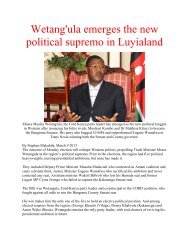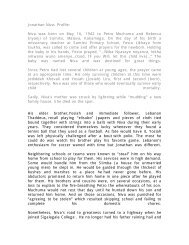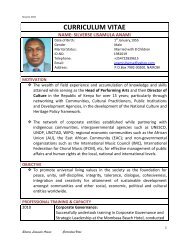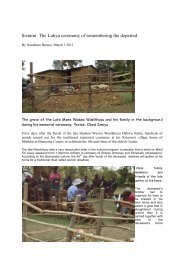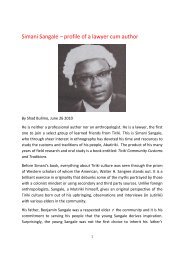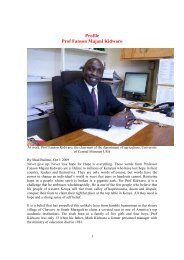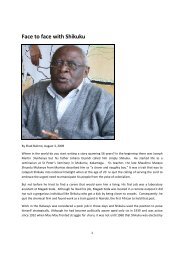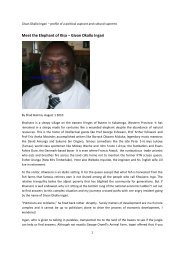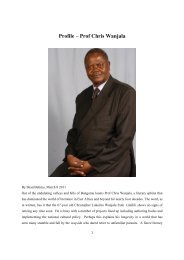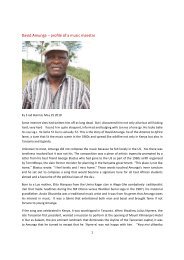Dr Jedidah Enoch-Onchere - Abeingo Community Network
Dr Jedidah Enoch-Onchere - Abeingo Community Network
Dr Jedidah Enoch-Onchere - Abeingo Community Network
You also want an ePaper? Increase the reach of your titles
YUMPU automatically turns print PDFs into web optimized ePapers that Google loves.
University lecturer wishes day had more than 24 hours<br />
By Shad Bulimo, July 20 2009<br />
She prefers to remain invisible. You need more than normal eyes to spot her in an<br />
audience. Yet this unassuming daughter of Butere is a Luhya gem that I feel<br />
privileged to have discovered recently. In a busy office block in Hackney, East<br />
London, a lot is going on pretty much unnoticed by the outside world. Deans London,<br />
a brainchild of <strong>Dr</strong> <strong>Jedidah</strong> <strong>Enoch</strong>-<strong>Onchere</strong> is restoring hope to hundreds of people for<br />
whom life had ceased to have a meaning through vocational training programmes that<br />
lead to immediate employment.<br />
Born to a church leader, <strong>Enoch</strong> Obulemire and Flora Apondi of Ebushirotsa, Butere,<br />
<strong>Jedidah</strong> Asumwa is the last born in a family of seven. Her siblings include Margaret<br />
Nandwa, Joel Eyinda, Fanuel Matati (deceased), Bernard Omolo, Jasper Mani, Eric<br />
Apindi (deceased). The first born child of <strong>Enoch</strong> and Flora, Shitseswa, died aged just<br />
ten.<br />
Butere Girls School a gift from her father: The soft-spoken <strong>Jedidah</strong> says although<br />
her mum inspired her, her dad had the greatest impact on her life. He was not only<br />
spiritually enriching, he was just a good person to the extent people always referred to<br />
him as omunabi (prophet). He was so selfless; Butere Girls High School is built on<br />
land he donated. His only request to the Board of Governors was that each year a girl<br />
1
from his clan, the abashirotsa gets a bursary. It is understood that this covenant is still<br />
observed to this day, 31 years since he left this world.<br />
Top of her class: <strong>Jedidah</strong> says her life has been guided by the values of hard work<br />
and fair play instilled into her as a child by her father. These values saw the young girl<br />
breeze through her “O” Levels at Butere Girls as a top student in 1969 with a very<br />
strong Division One of seven points (a point short of the maximum six). That earned<br />
her a place at the coveted Alliance Girls High School in Central Province where she<br />
studied her “A” Levels. She scored top grades to earn a place at the University of<br />
Nairobi, Kabete Campus to study Bachelor of Science in Agriculture.<br />
Winner of Shell Prize: But while <strong>Jedidah</strong> was studying hard, others were watching.<br />
The academically-gifted <strong>Jedidah</strong> was adjudged the Best Student in her year in 1975<br />
and won the coveted Shell Prize. This recognition only spurred <strong>Jedidah</strong> to work even<br />
harder. She was immediately admitted back for a master’s degree programme as part<br />
of staff training at Kabete. She specialised in Soil Science and went on to graduate in<br />
1978.<br />
PhD scholarship at Reading University: As part of her field work, she worked for<br />
one year at Muguga Agricultural Research Centre as a soil scientist. In the meantime,<br />
the rising star of <strong>Jedidah</strong> was attracting attention from all manner of places both local<br />
and international. Spoilt for choice, <strong>Jedidah</strong> chose to pursue academics at Reading<br />
University in UK after winning a scholarship from the International Atomic Energy<br />
Agency (IAEA). Atomic energy always conjures up memories of Hiroshima and<br />
Nagasaki where the Allied forces dropped the deadly atomic bombs to the recalcitrant<br />
Japanese who were fighting alongside Hitler during the Second World War. Our girl<br />
could have chosen to study the science of making weapons of mass destruction; she<br />
was wiser; she chose soil chemistry graduating with a PhD in 1982.<br />
Love in the air: Few mortals can cope with an intense academic programme let alone<br />
combine with anything else. But not for <strong>Jedidah</strong>. While she was busy submitting term<br />
essays, her eyes had also caught the eyes of a dashing young man by the name of<br />
Simeon <strong>Onchere</strong>, a son of the Abagusii, also at Kabete studying Agricultural<br />
Economics. The chemistry between the two young lovers generated so much heat it<br />
increased global warming. Conscious of the impact of their actions on the physical<br />
and social environment, the lovebirds solemnised their betrothal in a matrimonial<br />
ceremony in Nairobi in 1976 at St Andrews Church.<br />
Children arrive: A year later, God rewarded them with a son, Edward (married to<br />
Rachael from Hull, England) in Nairobi followed by a daughter, Diana in 1981 (now<br />
Mrs Diana Humphrey) in Reading, England. Besides the two, <strong>Jedidah</strong> also has Sylvia<br />
Kanya, 22 whom she adopted from Uganda. She has two grandchildren, Sophia, 3<br />
(Diana’s) and Siena, 2 (Sylvia’s).<br />
The marriage to <strong>Onchere</strong> lasted 21 years. <strong>Jedidah</strong> says she has no regrets that the<br />
marriage went on the rocks because she tried everything to make it work but<br />
“ultimately if you can’t reach a compromise, you have to let go.” She says her and<br />
<strong>Onchere</strong> were two very ambitious people who complimented and supported each<br />
other very well in their careers and contact networks.<br />
2
Choice between family and career : After acquiring her PhD from Reading, <strong>Jedidah</strong><br />
went to teach chemistry at Egerton College (now Egerton University). She was here<br />
for two years when her husband was appointed coffee attaché at the Kenya High<br />
Commission in London. “It was hard choice to make to join him in London as a<br />
housewife because I needed to continue with my career,” she says. A breakthrough<br />
came when the Kenya Government awarded her a research grant that allowed her to<br />
come to London to carry out research on soil fertility at the world renown Rothamsted<br />
Research Station, Harpenden, Hertfordshire (the oldest agricultural research station in<br />
the world).<br />
But that grant was only for one year and so in 1986, <strong>Jedidah</strong> decided to make another<br />
of those decisions that only super mortals are capable of – switch career. She enrolled<br />
for a diploma course in computing and artificial intelligence (precursor to satellite<br />
navigation technology) at London South Bank University. On completion she got a<br />
part time job at Barnet College teaching basic computing skills like word processing.<br />
“This gave me an opportunity to look after my family and earn an income,” she says.<br />
World Bank and UNDP consultant: During this time, another window of<br />
opportunity opened. She started consultancy work with World Bank and United<br />
Nations Development Programme (UNDP). They say you need to be in work to get<br />
better work. For <strong>Jedidah</strong>, her consultancy work with the two world organisations<br />
boosted her profile so much she was head hunted to lead an information technology<br />
community project in Stonebridge Park, one of the most deprived areas of North West<br />
London.<br />
“It was here that I first got the inspiration to branch out on my own. I felt I needed to<br />
put something back into the community. If we can’t create opportunities for ourselves,<br />
we cannot expect anyone else to create them for us,” she says.<br />
3
At work: <strong>Jedidah</strong> in her office at Deans London College. The former Egerton College<br />
(now university) chemistry lecturer says she wishes a day had more than 24 hours to<br />
enable her complete the workload in her in-tray.<br />
Giving something back to the community: Armed with the desire to make a<br />
difference in the community and fully equipped with the technical expertise and<br />
experience, <strong>Jedidah</strong> embarked upon setting up a series of Information Technology<br />
Colleges (ITeCs). Her first college was North London ITeC which she set up in<br />
4
partnership with two Nigerians, Joe Okoli and Ose Akpom. “The first two years were<br />
difficult as local authorities didn’t trust us. But we were prepared for the long haul.<br />
Our determination finally started bearing fruit and funding began flowing in and grew<br />
from strength to strength. Today me, Joe and Ose are no longer actively involved but<br />
the college is in full bloom. We are only consulted as and when necessary,” she says.<br />
Gave away her baby: Like her father before her, <strong>Jedidah</strong> created the North London<br />
ITeC and gave it away. Few can understand the logic of investing so much time,<br />
energy and resources in a project only to give it away when it begins to bear fruit.<br />
“From the beginning, the idea was not to benefit me or an individual but the<br />
community,” she retorts.<br />
The same deterministic zeal has seen <strong>Jedidah</strong> create three more colleges which again<br />
are running independent of her. First was UXL in Hackney where she fought to have<br />
Cisco taught at the tertiary level to the surprise of industry technocrats who always<br />
thought Cisco was strictly a university-level course. Next were East London ITeC and<br />
South London ITeC with another Nigerian, Peter Osalor. All these colleges are still<br />
running and besides the traditional IT training, she has added other vocational courses<br />
like sound engineering.<br />
Renew Trust: The sky looked like the limit but still laden with tonnes of energy,<br />
<strong>Jedidah</strong> was again head hunted to run Renew Trust, an agency that was involved in<br />
recycling domestic appliances. That was in 2002. Her remit was to set up 14 training<br />
centres across the UK to train people in recycling techniques within three years.<br />
Within one year, she exceeded all expectations. She set up eight in Gateshead,<br />
Plymouth, Harlow, Dagenham, Telford, Merseyside, Northampton and Leeds. But the<br />
travelling up and across the country took its toll even on the indefatigable <strong>Jedidah</strong>. So<br />
after just one year, she quit Renew Trust to set up Deans London.<br />
Deans London: <strong>Jedidah</strong> started Deans London with a small grant of £15,000 from<br />
The Learning Trust to teach people English but after one year, she decided to add<br />
domestic appliance repairing courses. In the last two years, she has added security<br />
training, customer services, cleaning and construction skills (plumbing, electrical<br />
installations, kitchen and bathroom installations), GCSE for disaffected young people,<br />
training to her stable. In addition, Deans London also offers courses in business<br />
administration, customer care and consultancy services. Last year, it won a major<br />
grant to document the culture of the Igbo tribe of Nigeria.<br />
Creating jobs: Most graduates eventually work as self employed. Deans London also<br />
provides:<br />
Business Start-up<br />
Employability<br />
Skills and Skills for Life - English courses - ESOL and preparation for IELTS,<br />
Citizenship,<br />
Modern Arts,<br />
Literacy & Numeracy,<br />
Information Advice and Guidance and ICT<br />
5
In 2007/2008, Deans London trained 738 people with additional 865 people enrolled<br />
this year alone (including 110 young people aged 14-19 years old). At the beginning<br />
of this year, Deans London employed 23 people but due to credit crunch, this number<br />
has shrunk to 17 while each of the four ITeC’s employs over 20 people.<br />
Success! What success?: Personal success doesn’t excite <strong>Jedidah</strong> much. She says<br />
her greatest satisfaction is to see the life of young people, especially black boys,<br />
transformed into something meaningful. With a strong outreach team, Deans London<br />
looks out for these youth and offers them a chance to train within their own post code<br />
area if they can’t travel far because of gang crimes. “To see people previously written<br />
off achieve something in their life is surreal,” she says. When one young man came in<br />
and said “thank you so much; you actually saved my life,” she felt her eyes twinge.<br />
Nonetheless, it is not lost on close observers just how much this woman from Butere<br />
has achieved. Last year, she won a Barking College Award for Excellence.<br />
Low moments: While <strong>Jedidah</strong> is self assured and satisfied with her work, she is only<br />
human and has her low moments. However the way she deals with disappointments<br />
and moments of emotional distress is to put everything on a scale. That is she rates<br />
everything in terms of importance or usefulness. For instance if she gets cross with<br />
you or something annoys her, she quickly evaluates whether it is worth spending her<br />
emotional energies locked up in a fit of anger. “If I decide it’s not worth my time, the<br />
most I can be angry is ten minutes,” she says. “I cannot invest more than 10 minutes<br />
in anger. It’s negative energy.”<br />
I wish a day had more than 24 hrs: <strong>Jedidah</strong>, whose favourite dish is a fish called<br />
lisatsu, says sometimes she feels disappointed with herself because she can never<br />
seem to do enough and wishes the day had more than 24 hours. Also she feels she<br />
disappoints people who build hopes in her and yet she can’t live up to their<br />
expectations simply because she just doesn’t have time.<br />
The altruist: The chemistry academic turned IT professional is also something of an<br />
altruist. She says she sees good in everyone and everything. “It is a matter of training<br />
your mind. If you are looking for negatives, you’ll see plenty,” she admonishes. It is a<br />
philosophy that has guided her life throughout. And while her father played a large<br />
part in influencing her way of life, it is her strong Christian faith that she finds<br />
soothing. When the bishop of her local Anglican church in Thamesmead, Christopher<br />
Chissum, needed a facilitator, it is to <strong>Dr</strong> <strong>Jedidah</strong> <strong>Enoch</strong>-<strong>Onchere</strong> that he turned to.<br />
“That was shocking,” she says. “It was a great honour.” That honour lasted 18 months<br />
spanning the years 2006-2007. Two years later she hasn’t recovered.<br />
Inspired by her mother: While her father influenced her conscience, her<br />
entrepreneurship is largely derived from her mother. The daughter of a Luo chief,<br />
Flora Apondi trained and worked as a teacher, nurse and farmer. At the same time,<br />
she conducted a successful wholesale business on the sides. “She was quite<br />
enterprising and inspirational,” she says of her mother who died in 1992 aged 78.<br />
<strong>Jedidah</strong> on her people, the Luhya<br />
6
Most people prefer to live in self denial. Not <strong>Jedidah</strong>. Of her people, the Luhya she<br />
says they are not aggressive enough. She says we Luhya like to play Mr. Nice and<br />
wait for someone to employ us. She says it is not bad to be nice but we need to learn<br />
to switch to Mr. Nasty if that is the way to achieve economic empowerment. “Sitting<br />
down and complaining about other tribes while we are doing nothing ourselves is self<br />
defeatist,” she says. “We have a jealousy streak. We are not happy when other people<br />
are succeeding. Few Luhya are serious. We are always playing the underdog but why<br />
should we when we have so many educated people?” she asks.<br />
Entrepreneurship: <strong>Jedidah</strong> whose favourite musician is Meatloaf (strange enough)<br />
says Luhya people need to recognize opportunities and learn to become entrepreneurs<br />
as jobs are scarce and traditional land tenure systems can’t sustain the next generation.<br />
Her example shines like a beacon of hope to millions of girls in Luhyaland. All you<br />
need to do is “Abide with me.''<br />
Shad Bulimo is the editor of www.abeingo.org, an online portal of the Luhya<br />
community of East Africa.<br />
7



